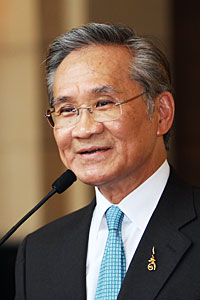On behalf of the Ministry of Foreign Affairs, I wish to offer my congratulations on the opening of the Hong Kong Economic and Trade Office (HKETO) in Bangkok this week.
The opening of HKETO, the 13th of its kind, and the third in Asean after Singapore and Jakarta, was recently officiated by Carrie Lam, the chief executive of the Hong Kong Special Administrative Region (SAR).
Key responsibilities for this office include the coordination, support and promotion of economic cooperation, as well as bilateral trade and investment facilitation.
The HKETO in Bangkok will also be responsible for Myanmar, Cambodia and Bangladesh, and will therefore play an important role in supporting many policy initiatives, including Thailand's Asean chairmanship's strategic policy of "Connecting the Connectivities".
This office will also reinforce the role of both Thailand and Hong Kong as gateways for trade and investment -- or "The Two Gateways" and "Thailand Plus One". Thailand can be the link or gateway for economic cooperation, trade and investment between Hong Kong, China and Southeast Asia, particularly under the Ayeyawady-Chao Phraya-Mekong Economic Cooperation Strategy (Acmecs) framework.
In turn, Hong Kong can be Thailand's gateway to the sub-region that includes Hong Kong and China, particularly the Guangdong-Hong Kong-Macao Greater Bay Area (GBA), which is one of China's most important economic bases, with a GDP of US$1.4 trillion (44 trillion baht) and population of almost 70 million people.
The fact that Hong Kong chose to set up its HKETO in Bangkok reflects its confidence in Thailand and the Thai government.
That decision has helped to raise Thailand's status and prestige as the hub for regional offices and international organisations.
The Thailand-Hong Kong relationship is a longstanding one. Thailand appointed its first consul-general to Hong Kong in 1881 during the reign of King Rama V, and our commercial relationship with Hong Kong has grown from strength to strength ever since.
This growth trajectory continues today, after Hong Kong was returned to China in 1997, with cooperation between Thailand and Hong Kong even stronger and closer than before. Currently, the Thailand-Hong Kong relationship is highly dynamic, covering wide-ranging issues and various aspects, particularly economics and trade.
In 2018, Hong Kong was Thailand's ninth-largest trading partner with a total trade volume of $15.47 billion, with Thailand exporting $12.52 billion. Both sides have set a bilateral trade target of $20 billion by 2020.
On investment, during the third quarter of 2018, Hong Kong was the fourth-largest foreign investor in Thailand, with $15.75 billion in cumulative investment. On the Thai side, Hong Kong is our largest overseas investment destination with US$18 billion in cumulative investment.
Furthermore, I am confident the Asean-Hong Kong SAR FTA (AHKFTA) and the Agreement on Investment between Asean-Hong Kong SAR (AHKIA), which should come into force this year during Thailand's Asean chairmanship, will be another factor that contributes to Thailand and Hong Kong reaching their common trade target.
Thailand is pleased with the announcement on Feb 18 by the Chinese government of the Outline Development Plan of the Guangdong-Hong Kong-Macao Greater Bay Area (GBA), which aims to develop this region, already a strong economic hub, into a world-leading bay economy.
The development plan has reinforced Hong Kong's status and potential as a link between China and other countries along the Belt and Road Initiative (BRI).
It also highlights Hong Kong's creative role as a "connector, investor, and operator" for the GBA and BRI.
With Thailand's role, as well as its potential and geographical location, the nation can utilise the development of the GBA not only as a support base to further advance our own "Thailand 4.0" policy, but also as a link to connect Hong Kong and China with other countries in the Mekong River Sub-Region and Asean.
The HKETO will further accelerate trade and investment between Thailand, China and Hong Kong, and contribute to more dynamic and tangible cooperation.
The cooperation captures perfectly how both Thailand and Hong Kong are working together to foster a faster and hassle-free form of connectivity, as well as creating more opportunities for closer people-to-people interactions.
The success of this will provide benefits in the long-run, as well as contribute to our own sustainable development.
Don Pramudwinai is Thailand's Minister of Foreign Affairs.
